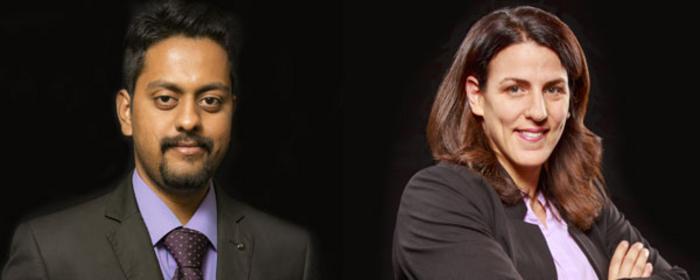East Hanover, NJ – May 30, 2023 – Annually, New Jersey Health Foundation (NJHF) invites researchers to submit applications for grants aimed at supporting pilot research projects that exhibit promising potential. These grants serve as opportunities for scientists to utilize their initial findings to secure further funding and progress their research. This year, NJHF granted awards to two Kessler Foundation scientists to conduct studies that expand research in upper extremity exercise after stroke and brain injury and restoration of cardiovascular function in spinal cord injury populations.

Credit: Kessler Foundation
East Hanover, NJ – May 30, 2023 – Annually, New Jersey Health Foundation (NJHF) invites researchers to submit applications for grants aimed at supporting pilot research projects that exhibit promising potential. These grants serve as opportunities for scientists to utilize their initial findings to secure further funding and progress their research. This year, NJHF granted awards to two Kessler Foundation scientists to conduct studies that expand research in upper extremity exercise after stroke and brain injury and restoration of cardiovascular function in spinal cord injury populations.
Vikram Shenoy Handiru, PhD, research scientist in the Center for Mobility and Rehabilitation Engineering Research, received a one-year, $35,000 grant for his study named “Remote Supervised Upper-extremity Motor Exercises (ReSUME) using combined Transcranial Electrical Stimulation and Wearable Sensor-based Exergaming in Stroke.” The project focuses on targeted, noninvasive brain stimulation methods combined with sensor-based exergaming for improving hand dexterity in stroke and traumatic brain injury populations.
Nearly 800,000 people in the U.S. have a stroke every year, and many of them end up with long-term, debilitating arm and hand functional impairment. However, due to limited insurance coverage, practical constraints of transportation, and lack of access to continued rehabilitation, most chronic stroke survivors do not receive adequate rehabilitation treatment, resulting in further functional decline. “To address this problem, our proposed study will combine transcranial direct current stimulation (tDCS) and wearable, sensor-based video game exercises for training the paretic arm’s motor functions,” explained Dr. Shenoy Handiru. “Both tDCS and gaming exercises will be monitored remotely to allow individuals who have had a stroke to engage in the training in the comfort of their homes,” he added.
“With the funding from NJHF, we will be able to study the feasibility of whether stroke rehabilitation can be done in a remote-supervised manner. In addition, the wearable sensors will measure the ‘movement quality’ of the affected hand,” said Dr. Shenoy Handiru. The preliminary data from this study will be used to plan larger randomized controlled trials supported by funding from federal grants.
Einat Engel-Haber, MD, a postdoctoral fellow in the Center for Spinal Cord Injury Research and the Tim and Caroline Reynolds Center for Spinal Stimulation, also received a $35,000, one-year NJHF grant for her study, titled “Neuromodulation of Blood Pressure Using Transcutaneous Spinal Stimulation in Individuals with a Chronic Spinal Cord Injury.”
“Cardiovascular control is often impaired in individuals with a high level (thoracic level T6 or above) spinal cord injury resulting in short- and long-term health complications and a decline in quality of life,” stated Dr. Engel-Haber. “In recent years, epidural spinal cord stimulation has been explored with promising results as a potential treatment for cardiovascular dysfunction,” she explained, adding, “Spinal cord transcutaneous stimulation (scTS) represents an alternate approach, with a potential to benefit more people and with fewer risks. Our study aims to investigate the effect of spinal cord transcutaneous stimulation on blood pressure in individuals with chronic spinal cord injury who experience orthostatic hypotension,” said Dr. Engel-Haber.
Orthostatic hypotension is characterized by a significant decrease in blood pressure when moving from lying flat (supine) to an upright position. It typically appears early after injury and is frequently accompanied by dizziness, weakness, fatigue, and even fainting. “In the long term, although symptoms typically diminish, orthostatic hypotension still clinically occurs in 50% of individuals with a cervical injury,” she said and has social and emotional, as well as physical, consequences. “Moreover, blood pressure instability is associated with a decline in cardiovascular health and contributes to the three- to four-fold increased risk for stroke and heart disease in this clinical population,” Dr. Engel-Haber added.
Stimulation sites and parameters that consistently increase and stabilize systolic blood pressure during an orthostatic provocation (a 70° tilt-test) will be sought, she said, adding, “We will also evaluate whether there is any change in the blood pressure response following repeated stimulation sessions.” This project will provide the foundational evidence to support the use of scTS to improve autonomic function in individuals with spinal cord injury, and help overcome barriers to engagement in activity and participation imposed by autonomic dysfunction.
Funding: New Jersey Health Foundation (grants PC 30-23, PC 8-23)
About New Jersey Health Foundation
As a nonprofit organization, the mission of New Jersey Health Foundation (NJHF) is to advance innovations in health for the benefit of society. NJHF is committed to supporting the development of health-related research and start-up companies in New Jersey. NJHF’s grant programs support exciting research projects in the very early stages of development as well as a segment of funding for community health, social service issues, and education projects. The funding NJHF provides is critical to advance ideas that have great potential to have a positive impact on human health and patients everywhere. For more information, visit njhealthfoundation.org.
About Kessler Foundation
Kessler Foundation, a major nonprofit organization in the field of disability, is a global leader in rehabilitation research. Our scientists seek to improve cognition, mobility, and long-term outcomes, including employment, for adults and children with neurological and developmental disabilities of the brain and spinal cord including traumatic brain injury, spinal cord injury, stroke, multiple sclerosis, and autism. Kessler Foundation also leads the nation in funding innovative programs that expand opportunities for employment for people with disabilities. For more information, visit KesslerFoundation.org.
Press Contacts at Kessler Foundation:
Deborah Hauss, [email protected];
Carolann Murphy, [email protected].
Stay Connected with Kessler Foundation
Twitter | Facebook | YouTube | Instagram | SoundCloud




